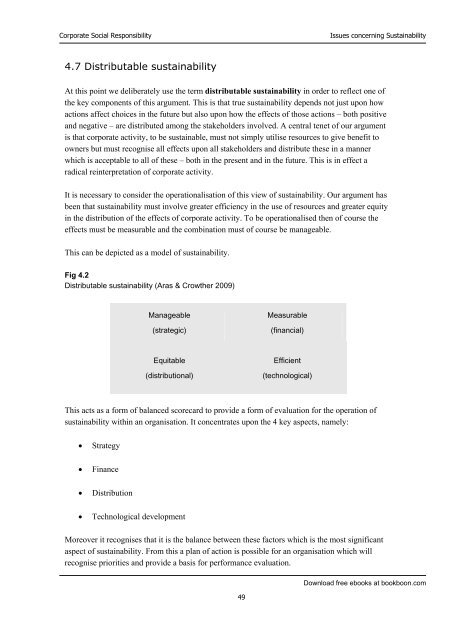Defining Corporate Social Responsibility - Tutorsindia
Defining Corporate Social Responsibility - Tutorsindia
Defining Corporate Social Responsibility - Tutorsindia
Create successful ePaper yourself
Turn your PDF publications into a flip-book with our unique Google optimized e-Paper software.
<strong>Corporate</strong> <strong>Social</strong> <strong>Responsibility</strong><br />
Issues concerning Sustainability<br />
4.7 Distributable sustainability<br />
At this point we deliberately use the term distributable sustainability in order to reflect one of<br />
the key components of this argument. This is that true sustainability depends not just upon how<br />
actions affect choices in the future but also upon how the effects of those actions – both positive<br />
and negative – are distributed among the stakeholders involved. A central tenet of our argument<br />
is that corporate activity, to be sustainable, must not simply utilise resources to give benefit to<br />
owners but must recognise all effects upon all stakeholders and distribute these in a manner<br />
which is acceptable to all of these – both in the present and in the future. This is in effect a<br />
radical reinterpretation of corporate activity.<br />
It is necessary to consider the operationalisation of this view of sustainability. Our argument has<br />
been that sustainability must involve greater efficiency in the use of resources and greater equity<br />
in the distribution of the effects of corporate activity. To be operationalised then of course the<br />
effects must be measurable and the combination must of course be manageable.<br />
This can be depicted as a model of sustainability.<br />
Fig 4.2<br />
Distributable sustainability (Aras & Crowther 2009)<br />
Manageable<br />
(strategic)<br />
Measurable<br />
(financial)<br />
Equitable<br />
(distributional)<br />
Efficient<br />
(technological)<br />
This acts as a form of balanced scorecard to provide a form of evaluation for the operation of<br />
sustainability within an organisation. It concentrates upon the 4 key aspects, namely:<br />
<br />
<br />
<br />
<br />
Strategy<br />
Finance<br />
Distribution<br />
Technological development<br />
Moreover it recognises that it is the balance between these factors which is the most significant<br />
aspect of sustainability. From this a plan of action is possible for an organisation which will<br />
recognise priorities and provide a basis for performance evaluation.<br />
49<br />
Download free ebooks at bookboon.com
















